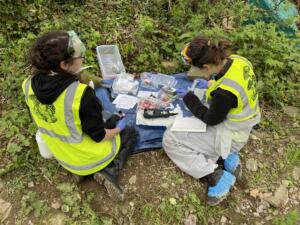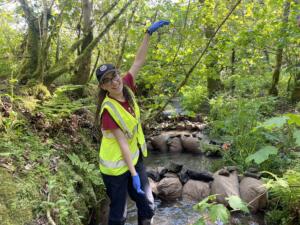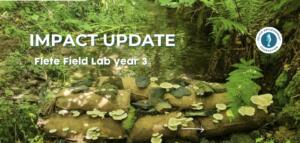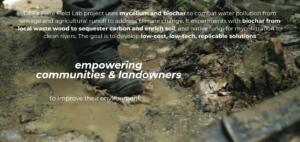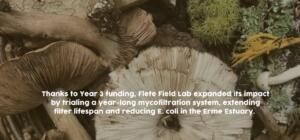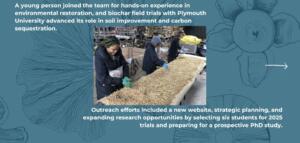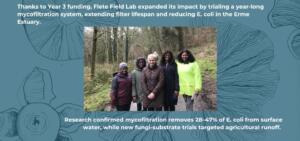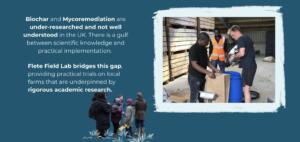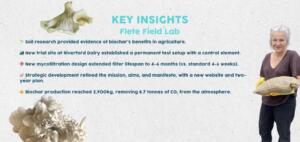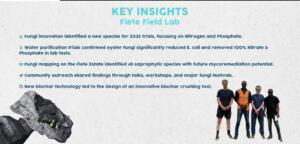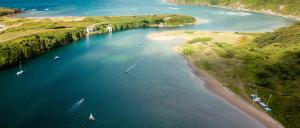
Grants
Landscape Regeneration
Flete Field Lab, Year 3
£29,758 awarded
Project Dates: 01.12.23 to 01.04.25
DEF’s Flete Field Lab project is trialling Mycelium and Biochar recipes to address water pollution caused by sewage outlets and agricultural run-off, while mitigating the effects of climate change.
It is experimenting with biochar made from local waste wood to sequester carbon and enhance soil quality, and the use of native fungi to clean up river pollution via mycofiltration – with the overall aim of identifying replicable low-cost, low-tech solutions that empower landowners and communities to improve their local environment.
The project works closely with Plymouth University’s professional laboratories to test and prove efficacy, as well as researchers from around the world (due to the ground-breaking nature of this work).
Year 3 funding enabled Flete Field Lab to build on its success to date and:
- Trial a year long new mycofiltration design to extend the life of the projects installations and reduce e.Coli entering the Erme Estuary from Holbeton Brook.
- Prove that mycofiltration can remove between 28-47% e.Coli from surface water streams.
- Trail a new type of fungi and substrate mix to apply to areas on land that are suffering from agricultural run-off.
- Support a young person to work with Flete Field Lab to help deliver work and become part of the team.
- Produce and apply more biochar in practical field trials – working with Plymouth University to identify and share the best methods to use biochar as an agricultural soil improver and a means of carbon sequestration.
- Launch a new website, work with a Development Lead and hone their mission, aims and plans for the next two years.
- Identify six new students for the project’s trials in 2025 plus a prospective PHD study.
Biochar and Mycoremediation are under-researched and little understood in the UK. There is a gulf between scientific knowledge and practical implementation. Flete Field Lab bridges this gap, providing practical trials on local farms that are underpinned by rigorous academic research.
See DEF’s 1 min film about Flete Field Lab HERE.
This grant was generously funded by John Swire 1989 Charitable Trust.
Thanks also to Olympus Power for supporting with the purchase of a biochar kiln and biochar crusher to increase the amount of carbon sequestered into local soil.
Photo credits: Flete Field Lab.
IMPACT SUMMARY MARCH 2025:
- Flete Field Lab have trialled a successful new mycofiltration design that has proven to extend the life of the filters to between 4-6 months instead of a ‘standard’ sack which lasts approximately 4-6 weeks.
- The project has worked with a Development Advisor to hone its mission, aims and manifesto and website, alongside developing a strategy and plan for the next two years.
- Overall Flete Field Lab have produced 2900kg of biochar equating to 8.7 tonnes of CO2 removed from the atmosphere
- Flete Field Lab’s work has produced evidence for some of the brilliant benefits of biochar in the soil.
- The project has trialled a new design at Riverford Dairy, creating a more permanent test site with a control element for future trials.
- Flete Field Lab have identified a new fungi to trial during 2025 when our focus will include Nitrogen and Phosphates.
- The project’s activities have proven that the oyster species used in our trials reduces e.Coli at significant levels and that in the lab it removed up to 100% Nitrate and Phosphate from dairy waste water.
- 45 species of saprophytic fungi have been mapped on the Flete Estate that could prove highly effective in mycoremediation in the future.
- The project has shared findings with a large number of communities in England through multiple talks, workshops and by attending two main fungi festivals.
- Flete Field Lab have designed a new piece of kit for crushing biochar, which represents an important step toward making biochar processing more efficient and accessible to farmers and land managers.
- Successfully culture a UK-native shaggy ink cap fungus, which shows promise for soil-based remediation.
Surprising outcomes!
After a three year search……. Flete Field Lab have found two colonies of Pleurotus growing alongside local rivers – one on the Dart and one on the Avon. This is a phenomenal addition to our ‘library’ which are cryogenically frozen and have been DNA tested by our partners Rhizocore. Based in Edinburgh.
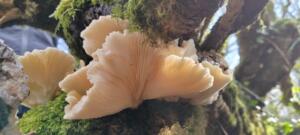
Flete Field Lab are also working with National Trust A La Ronde to support the installation of a sculpture incorporating the project’s biochar by internationally renowned artist Anne Duk Hee Jordan
